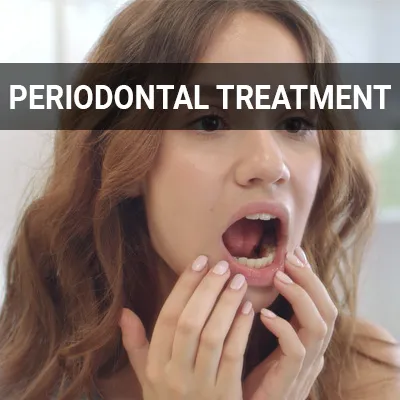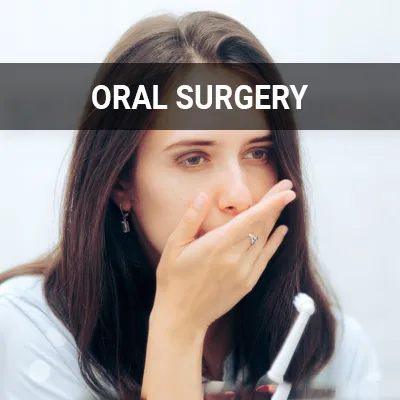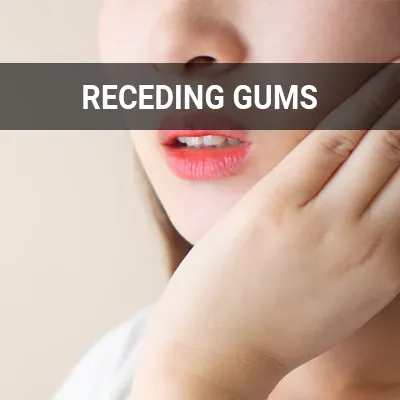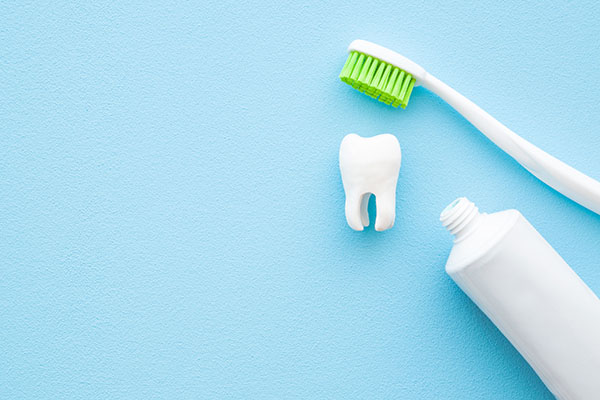Gum Disease Plano, TX
Gum disease is a common but very treatable and preventable disease. Since it can develop despite people's best efforts, professional dental treatment is a crucial component to preventing gum disease. Along with a strong at-home oral hygiene routine, our team wants to make sure you have all the resources you need to keep gum disease in check— for the benefit of your oral as well as your overall health.
Your gums are an important part of your oral and overall wellness. Help with the treatment and prevention of gum disease is available at Texas Implant & Dental Specialists in Plano and the surrounding area. If you are concerned, call our office at (972) 535-6555 to schedule an appointment.
What is Gum Disease?
According to the Centers for Disease Control and Prevention(CDC), close to half of all U.S. adults over 30 have some form of gum disease. Gum disease is an infection of the gums, bones, and tissues that support the teeth. The early form of gum disease begins as gingivitis. However, there is not much discomfort at this stage, and the symptoms are so mild they do not alarm most people.
If a person does not improve their oral health to reverse gingivitis, it can progress to the more serious form of gum disease, periodontitis. The gums can then start to pull away from the teeth leaving the roots and underlying bone vulnerable to damage. At this stage, a person is at risk of tooth loss and damage to the jawbone. Once periodontitis sets in, the disease cannot be reversed, only managed.
“If a person does not work to improve their oral health to reverse gingivitis, it can progress to the more serious form of gum disease, periodontitis.”
Common Causes of Gum Disease
The most notable cause of gum disease is poor oral hygiene. Without proper brushing and flossing, plaque forms on teeth and hardens into tartar around the gum line, causing inflammation. Once the plaque has hardened into tartar, only a professional dental cleaning can remove it. Therefore, the absence of regular professional dental cleanings is another major factor behind the development and progression of gum disease.
When the gum inflammation becomes ongoing, pockets eventually develop between the gums and teeth. These pockets get deeper as they fill with bacteria from plaque and tartar. At this point, tooth loss and loss of the bone tissue supporting the teeth become a real threat. Gum disease is not only hard on the mouth but the rest of the body as well. Gum disease can put a strain on your immune system and has been linked to coronary artery disease, problems managing diabetes, respiratory disease, and rheumatoid arthritis.
“Without proper brushing and flossing, plaque continues to form on teeth and harden into tartar around the gum line, causing inflammation.”
Symptoms of Gum Disease
During the initial stage of gum disease, gingivitis, gums will become swollen and bleed more easily. At this stage, people may notice bleeding when they brush their teeth. Overall, the symptoms are usually so subtle that a person may not even know they have the beginning stages of gum disease. This is one reason dental appointments every six months are crucial. A practitioner can bring gingivitis to the patient's attention so they can take steps to resolve it before it has the chance to progress to periodontitis. Additional symptoms of gingivitis include:
- Bright red/purple and tender gum
- Halitosis (bad breath)
- Receding gums
- Soft and swollen gums
Things become more complicated once periodontitis sets in. A clear sign of periodontitis is loose teeth due to damage of the supporting soft tissue and bone. This damage can be stopped with the proper intervention, but it cannot be reversed.
“Overall, the symptoms are usually so subtle that a person may not even know they have the beginning stages of gum disease.”
Check out what others are saying about our dental services on Yelp: Gum Disease in Plano, TX
Risk Factors for Gum Disease
Many factors determine gum health and the risk of gum disease. Not all of these factors are within a person’s control. According to the American Academy of Periodontology, factors that influence a person’s risk of gum disease include:
- Age: Studies show that older Americans have a higher rate of gum disease. This is especially true for those 65 and older.
- Bruxism: This is more commonly referred to as teeth grinding or clenching, and it can speed up the rate of the disease. Also, it often happens at night, so many are unaware they are doing it.
- Certain Systemic Diseases: Diabetes, cardiovascular disease, and rheumatoid arthritis can make the condition of the gums worse.
- Genetics: Some are genetically predisposed to gum disease. Therefore it is important to know one’s family history of the disease.
- Medications: Oral contraceptives, antidepressants, and certain heart medications are among the drugs that impact your oral health.
- Obesity and Poor Diet: Research has shown that obesity may increase a person’s risk of gum disease. In addition, a diet low in nutrients can stress the immune system making gum disease worse.
- Stress: How much stress a person is under affects how well they can fight diseases like gum disease.
- Tobacco Use: Along with cancer, lung, and heart disease, those that smoke and use tobacco are at higher risk for gum disease as well.
Gender is another factor to consider. A woman's hormonal changes during puberty, menstruations, pregnancy, and menopause can impact her gums. Therefore, it is important to be aware of your risk level and change negative health habits that can lead to gum disease.
“Studies show that older Americans have a higher rate of gum disease.”
Questions Answered on This Page
Q. What are the symptoms of gum disease?
Q. What factors influence a person's risk of gum disease?
Q. How can gum disease be treated?
People Also Ask
Q. What are the types of periodontal procedures?
Q. What conditions can be treated by oral surgery?
Q. What types of gum medications are there? What medications get prescribed for certain gum conditions?
Q. What can an oral cancer screening reveal?
Gum Disease Treatment
Root Scaling and Planing
A periodontist can employ a non-surgical procedure known as scaling and root planing to reverse gum disease in its early stages. A hygienist uses a scaler to remove plaque and tartar from above the gum line in a regular cleaning. Scaling and root planing goes a bit further and tends to take more than one visit. Often under local anesthesia, the practitioner will use the scaler to remove plaque and tartar from both above and below the gum line.
In root planing, the practitioner goes even deeper to smooth the root surfaces, so the gums will heal and more firmly reattach themselves to the teeth. Typically, this procedure makes the gums a little sore, but the pain can usually be managed with an over-the-counter pain reliever. The goal of this procedure is to reverse gum disease in the gingivitis stage. The hope is the patient will return for the follow-up appointment to discover the gum tissue is again healthy and that no further treatment is necessary.
Surgical Options
If gum disease has progressed further, surgical methods may need to be employed. A common procedure is flap surgery or pocket reduction surgery. The periodontist lifts the gums back to remove the tartar in this procedure and smooth any rough surfaces of the bone. Then, the gums are put back more tightly around the tooth, leaving less room for bacteria to grow. Bone or gum grafting surgery may be necessary if too many tissues supporting the teeth are damaged. The type of surgery depends on how far periodontitis has progressed. Medication, such as topical antibiotics, is often used in combination with procedures to keep periodontal bacteria at bay.
Periodontal surgery is an outpatient procedure, but the patient will want to arrange a ride home if they plan to be sedated during the procedure. Full healing can take up to two weeks, depending on the extent of surgery. However, the patient should be able to return to their regular activities a day after surgery. The periodontist will provide a more detailed idea of what to expect after the surgery, but typically it is a good idea to call the office if the patient experiences more swelling and discomfort than expected or bleeding that will not stop. After treatment for gum surgery, advice for the ongoing care of one's teeth is similar to it was before:
- Brush, floss, and use mouthwash daily
- Continue recommended number of checkups (usually twice a year)
- Eat a nutritious and well-balanced diet
- If you smoke, quit
“The hope is the patient will return for the follow-up appointment to discover the gum tissue is again healthy and that no further treatment is needed.”
Frequently Asked Questions
Q. What is involved in gum grafting?
A. Gum grafting usually involves taking tissue, typically from the roof of your mouth, and stitching it into the gum around the exposed root. There are a few different approaches to gum grafting, and the procedure used depends on the individual. Little discomfort is reported after the procedure, and it is usually manageable with over-the-counter pain relievers.
Q. Will insurance cover periodontal surgery?
A. Every policy is different. Most dental plans will cover at least a portion of surgery or treatment for periodontal disease. Often if a procedure is purely for cosmetic reasons, it will not be covered. You are advised to check with your dental insurance provider to see what is covered for you.
Q. How can I prevent the need for surgery?
A. Though no prevention plan can be made 100% full proof, there are clear steps you can take to stop gingivitis before it becomes periodontitis. It starts at home with brushing and flossing daily. It is also recommended you use an ADA-approved mouthwash. Seeing the dentist at least twice a year is crucial. This is often where the early stages of gum disease are caught and easily treated through scaling and root planing.
Q. How can gum disease affect the rest of the body?
A. The health of the mouth and the rest of the body are linked, meaning they both have an impact on each other. Research shows that gum disease increases your risk of heart attack, stroke, and complications due to diabetes. Gum disease has even been linked to Alzheimer's and dementia as well as complications during pregnancy.
Q. Why is periodontitis not reversible?
A. Unlike gingivitis, periodontitis is not entirely reversible. At this stage, bacteria have permanently damaged the structures supporting the teeth, and the disease cannot be managed with home oral hygiene alone. The patient must increase the number of professional cleanings they have each year. If the patent stays with a strong home oral hygiene routine and the prescribed number of periodontal cleanings, periodontitis can be well managed.
Start Feeling Better – Visit Us Today
By visiting us as soon as possible, our team can help get you the professional treatment you need. Instead of waiting around and allowing the symptoms to get worse, we can provide you with treatment options.
Definitions
Call Us Today
Though some form of gum disease is difficult to avoid, there are many treatment options. Our team at Texas Implant & Dental Specialists can help decide what is right for you. Call us today at (972) 535-6555 to learn more about our services or schedule an appointment.
Helpful Related Links
- American Academy of Periodontology (AAP). American Academy of Periodontology (AAP). 2023
- Center for Disease Control and Prevention (CDC), Periodontal Disease Page. Center for Disease Control and Prevention (CDC), Periodontal Disease Page. 2023
- WebMD, What Is a Periodontist?. WebMD, What Is a Periodontist?. 2023
About our business and website security
- Texas Implant & Dental Specialists was established in 2007.
- We accept the following payment methods: American Express, Cash, Check, Discover, MasterCard, and Visa
- We serve patients from the following counties: Collin County, Denton County and Dallas County
- We serve patients from the following cities: Plano, Frisco, Allen, McKinney, Garland, Richardson, Prosper, Wylie, Murphy, and Dallas
- Norton Safe Web. View Details
- Trend Micro Site Safety Center. View Details
Back to top of Gum Disease










